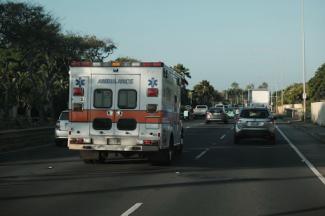
Cynthia Norwood, Hazel Mae Mack, and Vivian McMillan were all young when they came across the Black Panther Party. But, that didn’t stop them from saving lives in Winston-Salem, North Carolina with the Free Ambulance Program.
Living in a city shadowed by segregation meant there was one Black hospital nearby and another white hospital across town. When the Black hospital closed, people died, unable to travel to the other hospital. Ambulance rides required either a $75 cost or health insurance.
And in 1970, when ambulance services failed to help 15-year-old Alan Dendy after police shot him, action was especially vital.
Norwood, Mack, McMillan, and many more attended community college to train as EMTs. And despite financial barriers and harassment from the FBI, they received a grant to buy an ambulance.
“We were willing to put our shoulders to the wheel to show our people that we can do things ourselves, without the system,” remembered Mack.
Decades later, hospitals nationwide are still effectively segregated. One 2023 study says hospitals serving a significant amount of Black patients receive less funding. The impact is tangible.
We might not have the exact path or solutions as the Panthers, but their love and initiative can inspire us. How could you tackle or learn more about medical racism in your community today?